Fillable Printable Shareholders' Agreement Guide
Fillable Printable Shareholders' Agreement Guide

Shareholders' Agreement Guide

Shareholders’ Agreement
For companies with more than one shareholder, a
shareholders’ agreement is vital. Without a
shareholders’ agreement, the following scenarios could
prove to be disastrous for a private corporation:
Deteriorating relationship between shareholders;
Shareholders wishing to sell their shares;
A shareholder suffering a life threatening illness or dying; or
A major disagreement on how the business is managed.
These scenarios illustrate the importance of establishing a set of ground rules to help deal with
acrimonious situations.
Although shareholders’ agreements will vary based on the various complexities that each business
faces, the following is a list of provisions which may be included in a typical shareholders’ agreement:
Significant Decisions
This provision will stipulate that significant decisions require shareholders’ approval. Significant
decisions may include a major change in company direction, the sale of the company etc.
Future purchase/sale/transfer of shares
This provision provides for the future sale of shares (i.e. consent of the shareholders/directors is
required for future issue of shares). It might also restrict who can become a shareholder in the
company.
A “right of first refusal” provision stipulates that a shareholder wishing to sell their shares must first
offer the shares to existing shareholders before selling them externally.
A “shotgun clause” is an escape mechanism that shareholders can use in the event they cannot resolve
a serious dispute. In a “shotgun” arrangement one shareholder may offer to buy the shares of the other
shareholder for a stipulated price. The shareholder receiving the offer may either sell their shares at
that price, or buy the offering shareholder’s shares at that same price. This process aims to protect
both parties and encourages the shareholders to determine a fair price.
A shareholders’ agreement defines the duties and
obligations of shareholders in a private
corporation. This agreement should be thought of
as a set of ground rules which govern
shareholders’ behavior.

Shareholders’ Agreement
2
The agreement may also include the rules regarding the transfer of shares which may be triggered by
the following events:
death of a shareholder;
marriage breakdown of a shareholder;
bankruptcy/insolvency of a shareholder;
disability of a shareholder; and
retirement of a shareholder.
Finally, shareholders’ agreements often address the following:
how shareholder/employee are to be compensated;
how disputes are to be resolved (i.e. arbitration, mediation);
how the business is to be valued; and
how a buyout is to be implemented.
Although a shareholders’ agreement is a voluntary agreement, it is an essential tool in laying ground
rules for matters of significant impact to corporations. Please note that this article deals strictly with
privately held corporations. Public companies are regulated by the various securities regulations.
You should always consult a professional advisor before implementing a shareholder agreement.
The information contained herein has been provided by TD Wealth and is for information purposes only. The information has been drawn from sources believed to be
reliable. Where such statements are based in whole or in part on information provided by third parties, they are not guaranteed to be accurate or complete. Graphs and
charts are used for illustrative purposes only and do not reflect future values or future performance of any investment. The information does not provide financial, legal, tax or
investment advice. Particular investment, trading or tax strategies should be evaluated relative to each individual’s objectives and risk tolerance. TD Wealth, The Toronto-
Dominion Bank and its affiliates and related entities are not liable for any errors or omissions in the information or for any loss or damage suffered.
TD Wealth represents the products and services offered by TD Waterhouse Canada Inc. (Member – Canadian Investor Protection Fund), TD Waterhouse Private Investment
Counsel Inc., TD Wealth Private Banking (offered by The Toronto-Dominion Bank) and TD Wealth Private Trust (offered by The Canada Trust Company).
®/ The TD logo and other trade-marks are the property of The Toronto-Dominion Bank.
Revised 27/10/2011



